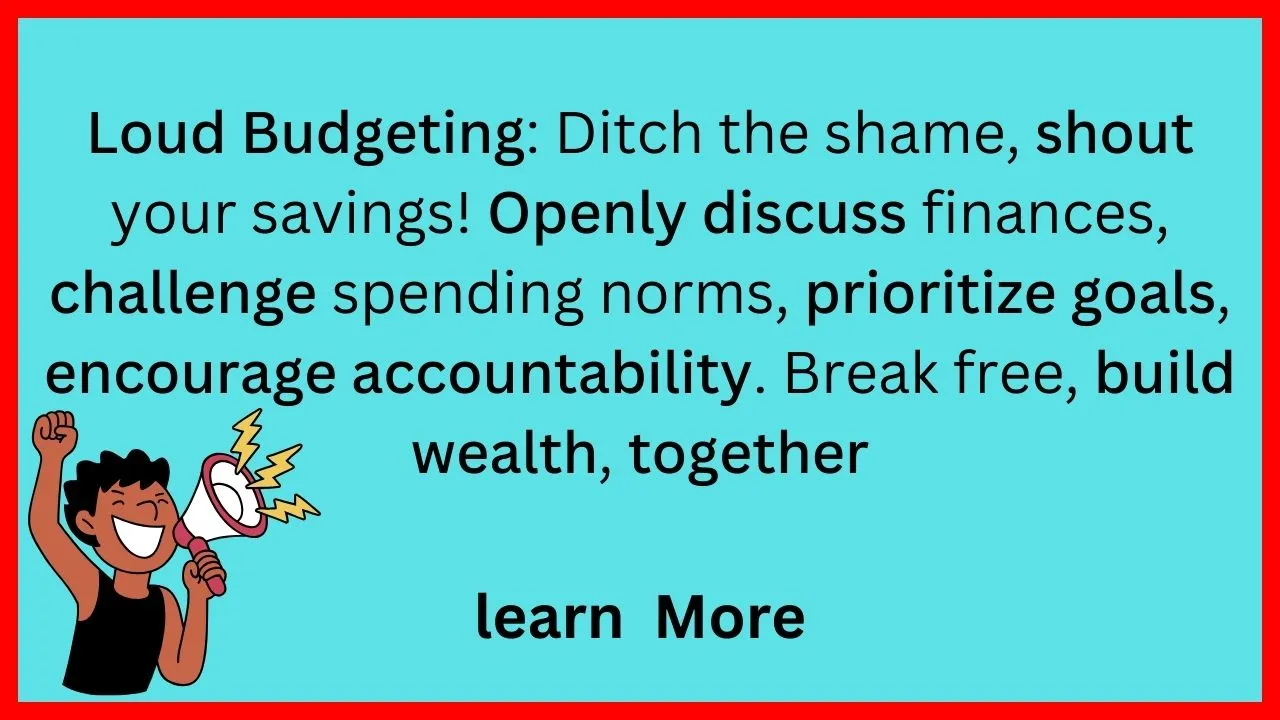How to Practice Loud Budgeting
Budgeting is a fundamental aspect of financial success, and practicing loud budgeting can make a significant difference in achieving your financial goals. Loud budgeting involves being vocal and deliberate about your financial plans, ensuring that you not only create a budget but actively engage with it. In this article, we will explore the steps to practice loud budgeting effectively and provide answers to common questions that may arise.
How to Practice Loud Budgeting:
Set Clear Goals:
Start by establishing specific financial goals. Whether it’s saving for a vacation, paying off debt, or building an emergency fund, having clear objectives will guide your budgeting process.
Create a Detailed Budget:
List all sources of income and categorize your expenses. Be thorough and realistic, accounting for both fixed and variable expenses. This provides a clear picture of your financial situation.
Prioritize Spending:
Allocate your income to essential expenses first, such as bills, groceries, and debt payments. Then, assign funds to discretionary spending. This ensures that your basic needs are met before non-essential spending.
Use Budgeting Tools:
Leverage digital tools and apps to track your expenses and monitor your budget in real-time. Many apps can categorize your spending automatically and provide insights into your financial habits.
Review and Adjust Regularly:
Regularly assess your budget to see if you’re staying on track. Life circumstances change, and your budget should adapt accordingly. Adjust your allocations based on evolving needs and priorities.
Involve Family or Housemates:
If applicable, include family members or housemates in the budgeting process. Discuss financial goals together and ensure everyone is on the same page to avoid misunderstandings or conflicts.
Stay Disciplined:
Practice discipline in adhering to your budget. Avoid impulse purchases and be mindful of your spending habits. Staying disciplined is key to achieving long-term financial success.
Build an Emergency Fund:
Allocate a portion of your income to building an emergency fund. Having a financial safety net can prevent unexpected expenses from derailing your budget.
Invest Surplus Funds:
If you find yourself with extra funds after meeting your financial goals, consider investing. This can provide long-term financial growth and contribute to your overall financial well-being.
Celebrate Financial Milestones:
Acknowledge and celebrate your achievements. Whether it’s paying off a significant debt or reaching a savings goal, recognizing your successes will help maintain motivation.
Frequently Asked Questions:
What is loud budgeting?
Loud budgeting is an approach where individuals actively engage with their budget, regularly discuss it, and openly communicate about financial goals and priorities.
How often should I review my budget?
It is recommended to review your budget at least monthly. However, more frequent reviews may be necessary during significant life changes or financial shifts.
Can I use a budgeting app for loud budgeting?
Absolutely. Budgeting apps can enhance the loud budgeting experience by providing real-time updates and insights into your spending habits.
Should I involve my family in budgeting discussions?
Yes, involving your family fosters transparency and ensures everyone is aligned with financial goals, reducing the likelihood of misunderstandings.
What if my financial situation changes?
Adjust your budget accordingly. Life events such as a job loss, salary increase, or unexpected expenses should prompt a review and adjustment of your budget.
Is it necessary to have an emergency fund?
Yes, an emergency fund provides a financial safety net for unexpected expenses, helping you avoid debt and stay on track with your budget.
How do I handle irregular income with loud budgeting?
Allocate a baseline for essential expenses, then create a plan for variable expenses based on your income fluctuations. Adjust your budget as needed.
What if I overspend in a specific category?
Identify the overspending, adjust future allocations, and explore ways to cut back in other areas to balance your budget.
Can I still enjoy leisure activities with loud budgeting?
Yes, budget for leisure activities within your discretionary spending category. Being mindful of your budget allows for guilt-free enjoyment.
How do I deal with unexpected expenses?
Use your emergency fund for unexpected expenses. If the expense exceeds your emergency fund, adjust your budget accordingly and plan for replenishing the fund.
Conclusion:
Loud budgeting is not just about creating a budget; it’s about actively participating in the financial planning process. By setting clear goals, using tools, and involving others, you can master the art of loud budgeting and pave the way for financial success. Remember, consistency and adaptability are key to achieving and maintaining financial stability.

